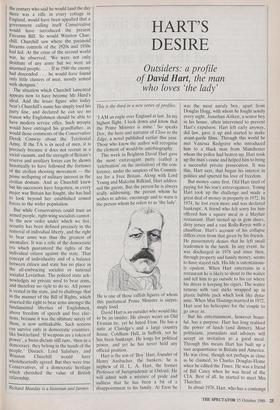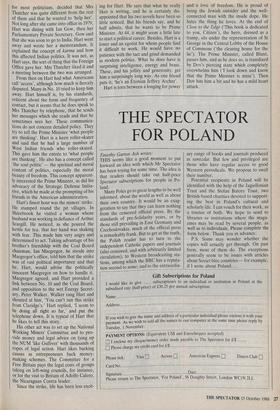HART'S DESIRE
Outsiders: a profile
of David Hart, the man
who loves 'the lady'
This is the third in a new series of profiles.
`I AM an eagle over England at last. In my highest flight. I look down and know that the Prime Minister is mine.' So speaks Dow, the hero and narrator of Close to the Edge, a novel published earlier this year. Those who know the author will recognise the element of would-be autobiography.
This week in Brighton David Hart gave the most extravagant party (called a `celebration' on the invitation) of the con- ference, under the auspices of his Commit- tee for a Free Britain. Along with Lord Young and Malcolm Rifkind, Hart addres- sed the guests. But the person he is always really addressing, the person whom he wishes to advise, encourage and to warn is the person whom he refers to as 'the lady'.
He is one of those raffish figures of whom this puritanical Prime Minister is surpri- singly fond. David Hart is an outsider who would like to be an insider. He always wears an Old Etonian tie, yet he hated Eton. He has a suite at Claridge's and a large country house, Coldham Hall, in Suffolk, yet he has been bankrupt. He longs for political power, and yet he has never held any official position. Hart is the son of 'Boy' Hart, founder of Henry Ansbacher, the bankers; he is nephew of H. L. A. Hart, the former Professor of Jurisprudence at Oxford. He will admit with a mixture of pride and sadness that he has been a bit of a disappointment to his family. At Eton he was the most unruly boy, apart from Douglas Hogg, with whom he fought noisily every night. Jonathan Aitken, a senior boy in his house, often intervened to prevent Hart's expulsion. Hart left early anyway, did law, gave it up and started to make avant-garde films. Through this world he met Vanessa Redgrave who introduced him to a black man from Manchester whom the police had beaten up. Hart took up the man's cause and helped him to bring a successful private prosecution. It was this, Hart says, that began his interest in politics and spurred his love of freedom.
But money came first. Old Hart tired of paying for his son's extravagances. Young Hart took up the challenge and made a great deal of money in property in 1972. In 1974, he lost even more and was declared bankrupt. A friend who felt sorry for him offered him a square meal in a Mayfair restaurant. Hart turned up in gym shoes, dirty jersey and a vast Rolls-Royce with a chauffeur. Hart's account of his collapse differs even from that given by his friends. He passionately denies that he left small tradesmen in the lurch. In any event, he was discharged in 1978 and since then, through property and family money, seems to have stayed rich. His life is ostentatious- ly opulent. When Hart entertains in a restaurant he is likely to shout to the waiter and tell him to go outside to his car where his driver is keeping his cigars. The waiter returns with vast sticks wrapped up in plastic bubble pack which look like dyna- mite. When Max Hastings married in 1972, Hart sent his helicopter for the couple to go away in.
But his entertainment, however boast- ful, has a purpose. Hart has long realised the power of lunch (and dinner). Most politicians, journalists and advisers will accept an invitation to a good meal. Through this means Hart has built up a vast acquaintance in Britain and America. He was close, though not perhaps as close as he claimed, to Charles Douglas-Home when he edited the Times. He was a friend of Bill Casey when he was head of the CIA. Best of all, he started to meet Mrs Thatcher.
In about 1978, Hart, who has a contempt
for most politicians, decided that Mrs Thatcher was quite different from the rest of them and that he wanted to 'help her'. Not long after she came into office in 1979, Hart was dining with Ian Gow, then her Parliamentary Private Secretary. Gow said that she was soon to go to India. Hart went away and wrote her a memorandum. It explained the concept of karma and how this affected Indian politics. It was not, as Hart says, the sort of thing that the Foreign Office gave her. Mrs Thatcher liked it and a meeting between the two was arranged.
From then on Hart had what Americans call 'access', although how much is fiercely disputed. Many in No. 10 tried to keep him away. Hart himself is, by his standards, reticent about the form and frequency of contact, but it seems that he does speak to Mrs Thatcher by telephone, that he sends her messages which she reads and that he sometimes sees her. These communica- tions do not concern detailed policy. They try to tell the Prime Minister 'what people are thinking'. Hart is a keen roller-skater and said that he had a large number of West Indian friends who roller-skated. This gave him the entrée to 'what people are thinking'. He also has a concept called `the soul politic' — the spiritual and moral content of politics, especially the moral beauty of freedom. This concept apparent- ly interested the Prime Minister, as did his advocacy of the Strategic Defense Initia- tive, which he made at the prompting of his friends in the American administration.
Hart's finest hour was the miners' strike. He stumped round the pit villages. In Shirebrook he visited a woman whose husband was working in defiance of Arthur Scargill. He noticed, as she poured the kettle for tea, that her hand was shaking with fear. This made him very angry and determined to act. Taking advantage of his brother's friendship with the Coal Board chairman, Ian Macgregor, he strode into Macgregor's office, told him that the strike was of vast political importance and that he, Hart, would advise the politically innocent Macgregor on how to handle it. Macgregor agreed, and Hart provided a link between No. 10 and the Coal Board, and opposition to the wet Energy Secret- ary, Peter Walker. Walker rang Hart and shouted at him, 'You can't run this strike from Claridge's.' Hart replied, 'I seem to be doing all right so far,' and put the telephone down. It is typical of Hart that he likes to tell this story.
His other act was to set up the National Working Miners' Committee and to pro- vide money and legal advice on tying up the NUM 'like Gulliver' with thousands of ropes of legal action. Hart likes backing causes as entrepreneurs back money- making schemes. The Committee for a Free Britain pays the legal costs of groups taking on left-wing councils, for instance, or for the visit to Britain of Adolfo Calero, the Nicaraguan Contra leader.
Since the strike, life has been less excit-
ing for Hart. He says that what he really likes is writing, and he is certainly dis- appointed that his two novels have been so little noticed. But his friends say, and he half admits, that he wants to be Prime Minister. At 44, it might seem a little late to start a political career. Besides, Hart is a loner and an egotist for whom people find it difficult to work. He would have no patience with the tact and grind demanded in modern politics. What he does have is surprising intelligence, energy and brass. These, and his jollity and generosity, get him a surprisingly long way. As one friend puts it, 'he's an Etonian Jeffrey Archer'. Hart is torn between a longing for power
and a love of freedom. He is proud of being the Jewish outsider and the well- connected man with the inside dope. He hates the thing he loves. At the end of Close to the Edge (`This book is dedicated to you, Citizen'), the hero, dressed as a tramp, sits under the representation of St George in the Central Lobby of the House of Commons (`the clearing house for the lie'). The Prime Minister, called Blunt, passes him, and as he does so, is transfixed by Dov's piercing stare which completely overwhelms him (I look down and know that the Prime Minister is mine'). Then Dov hits him a bit and he has a mild heart attack.



























































 Previous page
Previous page